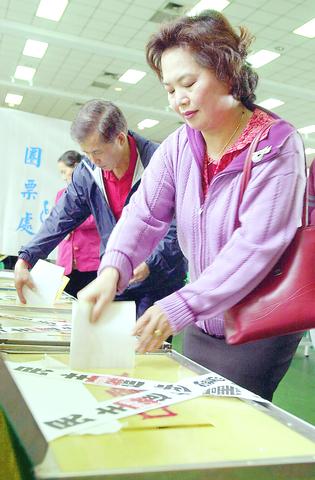The DPP held its primary elections yesterday, selecting 122 legislative candidates -- including 31 seats for lawmakers at large -- and 15 candidates for city mayors and county commissioners, completing the party's primary for the year-end elections.
Over 70 percent of the party's 190,000 eligible voters came out to the polls yesterday.

PHOTO: CHIANG YING-YING, TAIPEI TIMES
Nominations were based on public telephone polls, which accounted for 70 percent of each candidate's total score, and party members' votes, which accounted for the remaining 30 percent.
The party's New Tide faction (
The New Tide faction garnered six nominees for the mayoral and county commissioners' elections. Lee Chin-yung (
Government officials including the president's translator Hsiao Bi-khim (蕭美琴) and former vice chairman of the council of cultural affairs Lo Wen-chia (羅文嘉), dubbed the president's "boy scouts" because of their young age, also claimed victory in winning their legislative candidacies.
Hsiao was ranked first among those running for the overseas legislator-at-large seats, guaranteeing her a seat in the legislature, while Lo outnumbered other primary legislative candidates in the constituency of northern Taipei City.
Former vice chairman of the Cabinet's research, development and evaluation commission You Ying-lung (游盈隆), however, surprisingly lost his legislative candidacy to Lu Bo-chi (盧博基), who is currently a Hualien County councilor.
The DPP's primary has been enshrouded in talk of vote selling and other corrupt practices, which have tainted the party's otherwise clean image.
Frank Hsieh praised the results late last night, saying they showed that those who used vote buying were unable to get elected. He also said that the elections had further solidified the DPP's efforts to make its nominations transparent and fair.
"These are important markers for the democratization of party politics," Hsieh said.
Still, yesterday's voting encountered several incidents of cheating.
One female DPP member named Hsu Chen Hua-chih (許陳花枝) was found in Kaohsiung City to have cast her vote twice, with two conflicting birth dates.
The party's Kaohsiung City Chapter suspected that either two women had the same name or that Hsu had registered twice as a party member.
The chapter promised to conduct a thorough investigation into the case to see if there was voting misconduct or negligence.
A party member in Tainan City had his membership revoked after it was found that the individual held a fake party membership and had registered twice.
Voting practices which occurred at many polling stations nationwide also remain as a further challenge to the party's election system.
It was typical at some polling stations to see one sightseeing bus after another haul in groups of party members to cast their ballots.
It is widely understood that such a practice of mobilization was used to influence voters to support certain primary candidates.
Most of these voters could be seen -- on television news coverage of the primary -- getting off buses and collecting their membership identification cards from individuals who seemingly control their votes before they entered polling stations to cast their votes.
The practice, however, is not illegal according to the party's regulations.

MAKING WAVES: China’s maritime militia could become a nontraditional threat in war, clogging up shipping lanes to prevent US or Japanese intervention, a report said About 1,900 Chinese ships flying flags of convenience and fishing vessels that participated in China’s military exercises around Taiwan last month and in January have been listed for monitoring, Coast Guard Administration (CGA) Deputy Director-General Hsieh Ching-chin (謝慶欽) said yesterday. Following amendments to the Commercial Port Act (商港法) and the Law of Ships (船舶法) last month, the CGA can designate possible berthing areas or deny ports of call for vessels suspected of loitering around areas where undersea cables can be accessed, Oceans Affairs Council Minister Kuan Bi-ling (管碧玲) said. The list of suspected ships, originally 300, had risen to about 1,900 as

Japan’s strategic alliance with the US would collapse if Tokyo were to turn away from a conflict in Taiwan, Japanese Prime Minister Sanae Takaichi said yesterday, but distanced herself from previous comments that suggested a possible military response in such an event. Takaichi expressed her latest views on a nationally broadcast TV program late on Monday, where an opposition party leader criticized her for igniting tensions with China with the earlier remarks. Ties between Japan and China have sunk to the worst level in years after Takaichi said in November that a hypothetical Chinese attack on Taiwan could bring about a Japanese

MORE RESPONSIBILITY: Draftees would be expected to fight alongside professional soldiers, likely requiring the transformation of some training brigades into combat units The armed forces are to start incorporating new conscripts into combined arms brigades this year to enhance combat readiness, the Executive Yuan’s latest policy report said. The new policy would affect Taiwanese men entering the military for their compulsory service, which was extended to one year under reforms by then-president Tsai Ing-wen (蔡英文) in 2022. The conscripts would be trained to operate machine guns, uncrewed aerial vehicles, anti-tank guided missile launchers and Stinger air defense systems, the report said, adding that the basic training would be lengthened to eight weeks. After basic training, conscripts would be sorted into infantry battalions that would take

DEEP-STRIKE CAPABILITY: The scenario simulated a PLA drill that turned into an assault on Taiwan’s critical infrastructure, with the launchers providing fire support Taiwan yesterday conducted this year’s first military exercises at Longsiang Base in Taichung, demonstrating the newly acquired High Mobility Artillery Rocket System’s (HIMARS) ability to provide fire support and deep-strike capabilities. The scenario simulated an attack on Penghu County, with HIMARS trucks immediately rolling into designated launch areas and firing barrages at the Wangan (望安) and Cimei (七美) islands, simulating the provision of fire support against invading forces. The HIMARS are supposed to “fire and leave,” which would significantly increase personnel and equipment survivability, a military official said. The drill simulated an exercise launched by the Chinese People’s Liberation Army (PLA) Eastern